|
|
|
Sort Order |
|
|
|
Items / Page
|
|
|
|
|
|
|
| Srl | Item |
| 1 |
ID:
122047
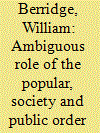

|
|
|
|
|
| Publication |
2013.
|
| Summary/Abstract |
This article addresses a number of obscurities surrounding the role of the various Sudanese police units often referred to as the 'religious police' or 'morality police'. These include the Popular Police, Society Police and Public Order Police. Although these units have often been analysed as agents of 'Arabization', 'Islamization' and the cultural domination of peripheral groups by the hegemonic northern riverain faction within the state, this article focuses instead primarily on the intra-northern debate over these units, which is suggestive of a variety of internal crises the northern government will need to resolve in the wake of secession. It contends that the Sudanese government has never resolved the ambiguity over whether these units function as local crime fighters or as guardians of religious morality. Although a number of analysts argue that the Sudanese regime has become less ideological and thus scaled back the morality police, this ambiguity remains highly relevant today, to the extent that it causes divisions within the security forces and even the government itself. The article further identifies the centrality of the debate over the public order units to the period of self-questioning that has characterized the 'post-Islamist' phase in Sudanese politics. It discusses the ambiguous social status of these units, who have been represented as guardians of urban Sudanese culture by their champions and a threat to it by their detractors.
|
|
|
|
|
|
|
|
|
|
|
|
|
|
|
|
| 2 |
ID:
122050
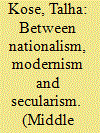

|
|
|
|
|
| Publication |
2013.
|
| Summary/Abstract |
This study discusses the position of Alevi identity and Alevi community with regard to the Turkish national identity-building project. There was a partial compatibility between the Kemalist objective of laicization and nation building and the Alevi practice and understanding of a 'local' version of 'Turkish Islam'. Besides these compatibilities, Alevis faced the challenges of nation-building and homogenization policies, which involved homogenization in ethnic, religious and sectarian domains. Kurmanji- and Zazaki-speaking ethnically Kurdish/Zaza Alevis of Eastern Anatolia had a different experience during the project of centralization and ethnic homogenization, in comparison to Turkish-speaking Turcoman Alevis. This different experience still is a source of division among Alevi communities.
|
|
|
|
|
|
|
|
|
|
|
|
|
|
|
|
| 3 |
ID:
122051
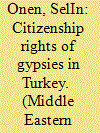

|
|
|
|
|
| Publication |
2013.
|
| Summary/Abstract |
This article compares two different Gypsy communities, the Roma community in Edirne and the Dom community in Diyarbakir, in terms of their access to citizenship rights (civil, social, political and cultural). The main argument is that in Turkey the Roma community has more access to citizenship rights than the Dom community due to the fact that the Roma community lives with Turks, the ethnic majority in Turkey, whereas the Dom community lives with Kurds, who are the majority in Diyarbakir but a minority group in Turkey. Further, the Roma community has closer connections with state and transnational space. The article explains how for both communities ethnicity is a common barrier to benefiting from full citizenship rights and why the equality principle of citizenship is ruptured for both communities.
|
|
|
|
|
|
|
|
|
|
|
|
|
|
|
|
| 4 |
ID:
122052


|
|
|
|
|
| Publication |
2013.
|
| Summary/Abstract |
This article focuses on the description and analysis of Operation Nickel Grass - the American airlift to Israel during the Yom Kippur War in 1973. The lessons learned from this venture had a decisive impact on subsequent American political and strategic planning policies globally and especially vis-à-vis the Middle East. Furthermore, and just as crucial, it totally transformed US-Saudi relations. The object lessons of this important Cold War big power confrontation and its long-range impact on US-Middle East relations are at the core of this study.
|
|
|
|
|
|
|
|
|
|
|
|
|
|
|
|
| 5 |
ID:
122053
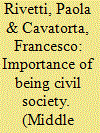

|
|
|
|
|
| Publication |
2013.
|
| Summary/Abstract |
Through a non-conventional understanding of civil society activism, the article provides an explanation of the relationship between the student movement and Khatami's governments in Iran. This study approaches 'civil society' as a space where we may observe the dynamics and exercise of power. The case study of the interactions between the Daftar-e Tahkim-e Vahdat and Khatami's governments illustrates how civil society is not a fixed concept, but a contested one. By analysing the conflicts and interactions between these two actors, the article examines the continuous negotiations that reinvent the meaning of civil society and produce political inclusion or exclusion.
|
|
|
|
|
|
|
|
|
|
|
|
|
|
|
|
| 6 |
ID:
122046
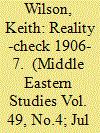

|
|
|
|
|
| Publication |
2013.
|
| Summary/Abstract |
The article deals with the British government's recognition of limitations of its power of defence against the Ottoman Empire. The material used comes mainly from the papers of the Committee of Imperial Defence.
|
|
|
|
|
|
|
|
|
|
|
|
|
|
|
|
| 7 |
ID:
122049


|
|
|
|
|
| Publication |
2013.
|
| Summary/Abstract |
This article follows the last 72 hours of the October 1973 Yom Kippur War; that is, the three days from the collapse of the first ceasefire, on 23 October, until 25 October, when the United Nations Security Council Resolution 340, which ended the war, was adopted. The goal is to present and analyse the interests of the United States and how it managed its policy vis-à-vis Israel and Egypt during the ceasefire imbroglio. However, the article devotes special attention to the serious crisis with the Soviet Union that played out during those fateful hours. It stemmed from the note sent by the leader of the Soviet Union, Leonid I. Brezhnev, to US President Richard M. Nixon on 24 October. From the contents of the message, senior American decision-makers concluded that the Soviets were planning the unilateral deployment of an armed force to the Middle East. In response to this threat, these officials decided to raise the state of alert of the American armed forces to Level 3. The main conclusion of the research, however, is that no real Soviet threat existed. On the contrary, the Soviet Union was interested in preserving détente and in continuing to cooperate with the United States in order to put an end to the violence in the Middle East.
|
|
|
|
|
|
|
|
|
|
|
|
|
|
|
|
| 8 |
ID:
122048
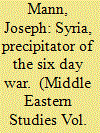

|
|
|
|
|
| Publication |
2013.
|
| Summary/Abstract |
The Six Day War is renowned for its impact on the shaping of the Middle East. In the last few decades, much research examining the reasons for the outbreak of the Six Day War, its development and its ramifications has been published. Most of the research has focused on an examination of Israeli government policy before and after the war, on the Egyptian regime's hatred of the 'Zionist entity' and on the involvement of the superpowers during and after the war. Some research has also touched on Syria's role in the outbreak of the war. Researchers such as Eyal Zisser and Moshe Maoz have shown Syria's decisive role in initiating the war and suggest that various factors, such as a lack of government stability in Syria, precipitated the conflict. This research continues, to a great extent, in the line of those researchers: indeed, it points to Syria as being the main factor behind the outbreak of war through an examination of the changes that occurred in the character of its government from 1966. However, unlike other research so far, this attempts to show that the unique character of the neo-Ba'ath regime is what brought war to the region and that, had the Ba'ath coup not occurred in 1966, it is doubtful whether Syria would have entered the conflict. This article seeks to emphasize that the Syrian regime went blindly into the war despite military unpreparedness and a lack of political and military cooperation with other Arab countries and with the Soviets. It also exposes, for the first time, the state of the Syrian troops on the front and in the cities, as well as the feelings of the senior officers on the eve of the war, and reveals documents about the military and political cooperation between Syria and Egypt that would eventually force President Nasser to enter a war he did not want to get involved in. Moreover, the research exposes the deep rift - which many believe pushed Syria to take rash independent measures -between the Soviet leadership and the Ba'ath regime before the war. And, finally, the research exposes the atmosphere in Syria following the war, and the administrative and military steps the Syrian regime took immediately after the defeat in order to consolidate its power.
|
|
|
|
|
|
|
|
|
|
|
|
|
|
|
|
|
|
|
|
|